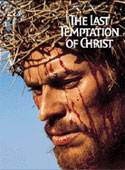
|
||
|
||
|
Monday, August 16, 2004
The Last Temptation of Christ
In the same article that published the "top 100 Pro-Catholic Films," the National Catholic Register also had a panel of movie critics select the top ten anti-Catholic movies -- here's the list, in their opinion:
1. The Order (2003) I will say that Stigmata and The Order and were absolutely painful to watch, with dialogue and plotlines so utterly deplorable they were not only anti-Catholic but constituted an offense to the art of cinema in general, and Sister Mary Explains It All was maliciously anti-Catholic, no doubt about it.
However, I disagree with what Steven Greydanus, movie reviewer for Decent Films.com and the National Catholic Register, had to say about Martin Scorsese' The Last Temptation of Christ: "The Last Temptation of Christ may be as profoundly offensive to Catholic sensibilities as it's possible for a film to be. Everything in it seems perfectly calibrated to trample on everything Catholics hold dear, from the depiction of Jesus as a fallible, fallen, virtually schizophrenic basket case, to its dismissive depiction of St. Peter and contrasting heroic portrait of Judas, to small touches like the deeply subversive image of the tempter (in the guise of a young girl) kissing the sacred wounds as she draws out the nails and takes Jesus down from the cross." 1 It is very interesting how two people can watch a movie and walk away with so utterly different impressions. For all of its flaws (theologically and cinematically), I found The Last Temptation to be an overall decent, profoundly moving and spiritually-enriching film. Unlike the others mentioned, it did not strike me as being in the least way intentionally or maliciously anti-Catholic. Nor does it make any claim to being an accurate representation of the Gospels (Scorcese in fact begins the film with a disclaimer to that effect). For those who haven't seen it, "the last temptation" is the call of the Devil to Jesus to descend from the cross, abandon his Father's divine mandate, and live an ordinary life together with the joys of marriage, sex and family (the reenactment of which is depicted in a dream sequence in the latter half). It was a cinematic adaptation of Nikos Kazantzakis' fictional meditation on the struggle between spirit and the flesh and the implications of Christ's assumption of humanity, about which he writes in his spiritual memoir, Report to Greco (1961): My principal anguish, and the wellspring of all my joys and sorrows, has been the incessant merciless battle between the spirit and the flesh. . . . Every man partakes of the divine nature in both his spirit and his flesh. That is why the mystery of Christ is not simply a mystery for a particular creed; it is universal. . . . Struggle between the flesh and the spirit, rebellion and resistance, reconciliation and submission, and finally-the supreme purpose of the struggle-union with God: this was the ascent taken by Christ, the ascent which he invites us to take as well, following in his bloody tracks. . . . One may justifiably criticize this film as being theologically and biblically inaccurate, and unorthodox. -- it is true that The Last Temptation's depiction of Jesus' humanity is excessive: as one suffering a perpetual identity crisis, subjected to voices and visions, questioning his divine calling. But, if we accept the fact that Jesus, contra docetism, took on our humanity, and that he was "in every respect tested as we are, yet without sinning"" (Hebrews 4:15), then it seems to me entirely plausible that the Devil might, as Kazantzakis imagined, tempt him with the legitimate goods of an ordinary earthly life. And while such a film might be unorthodox, I would have to disagree with Mr. Greydanus that The Last Temptation was deliberately made to be "perfectly calibrated to trample on everything Catholics hold dear." Rather, I find myself inclined to agree with the conclusions of this article in First Things: . . . And yet, many members of the opening day audiences who defied pickets and anathemas to see the film found it very moving. While opposition to the film is understandable, I believe it to have been in many ways wrongheaded. The fact that The Last Temptation of Christ has become shorthand for cultural degradation ought to disturb anyone who wants to preserve art's power to engage the moral imagination. If cultural conservatism is not to produce a backlash against itself, we must distinguish between seriously attempted efforts within the legitimate bounds of artistic creativity and ad hoc throwaways like Piss Christ . . .
Related Links:
Labels: cinema
|

Against The Grain is the personal blog of Christopher Blosser - web designer
and all around maintenance guy for the original Cardinal Ratzinger Fan Club (Now Pope Benedict XVI).
Blogroll
Religiously-Oriented
"Secular"
|
|














